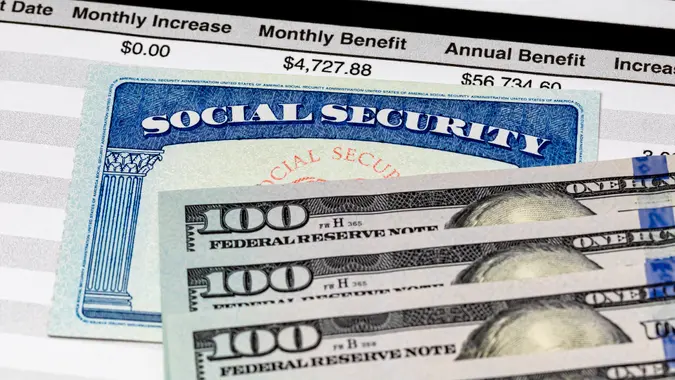Can Millionaires and Billionaires Collect Social Security?

Commitment to Our Readers
GOBankingRates' editorial team is committed to bringing you unbiased reviews and information. We use data-driven methodologies to evaluate financial products and services - our reviews and ratings are not influenced by advertisers. You can read more about our editorial guidelines and our products and services review methodology.

20 Years
Helping You Live Richer

Reviewed
by Experts

Trusted by
Millions of Readers
While former governor of New Jersey and current 2024 GOP presidential hopeful, Chris Christie, doesn’t even know if Berkshire Hathaway chairman and CEO Warren Buffett — the sixth richest person in the world — claims benefits, it hasn’t stopped him from lashing out at The Oracle of Omaha in regard to collecting Social Security benefits.
“I don’t know if [Buffett] is collecting Social Security, but if he is, shame on you,” said Christie during the Republican presidential primary debate in November. “You shouldn’t be taking the money.”
This isn’t the first time Christie has spoken out against the “extraordinarily wealthy” collecting Social Security. And although some may agree that millionaires or billionaires don’t need the extra income after they pass the Social Security age of eligibility, the very wealthy are still eligible for Social Security benefits if they have paid into the Social Security system through payroll taxes during their working years.
As millionaires and billionaires by definition earn more money than most Americans throughout their careers, they also pay a higher amount of tax into the program. Social Security benefits are not solely based on an individual’s wealth or income level, but rather on their work history and earnings that have been subject to Social Security taxes.
So, even though they earn more than the average American throughout their careers, millionaires and billionaires also pay a higher amount of tax into the program. Just because they may not be “in need” when they retire doesn’t mean they haven’t funded the program along the way.
How Is Social Security Funded?
Social Security benefits are calculated based on the individual’s highest 35 years of inflation-adjusted earnings. The amount a person receives in Social Security benefits is not directly affected by their current income or wealth. Therefore, even if someone is a millionaire or billionaire, they can still receive Social Security benefits if they have a qualifying work history.
Current workers pay into the system now for the benefit of retirees, and when those workers retire themselves, their retirement will be funded by the next generation of taxpayers.
Additional money is paid into the system from the Social Security Trust Fund, which consists of excess contributions from prior years, federal taxes paid on Social Security benefits and interest and reimbursements.
However, the Social Security trust funds that approximately 67 million Americans rely on for benefits are scheduled to be depleted in 2034, according to the annual trustees’ report released by the Treasury Department in March 2023. At that time, 80% of scheduled benefits will be payable from the combined funds for old age and survivors insurance and disability insurance (OASDI) unless Congress takes action.
What Is the Social Security Tax Rate?
Current workers pay a tax of 6.2% in Old-Age, Survivors and Disability Insurance taxes, along with 1.45% in Medicare taxes. Combined, workers pay 7.65% of their income into Social Security up to a certain income amount. Employers pay a matching 7.65% tax on behalf of their workers. As self-employed workers are both employers and employees, they have to pay both sides of the tax, amounting to a total of 15.3%.
How Do Wealthy Americans Benefit From the Structure of Social Security Taxes?
Although all workers with earned income pay 6.2% in OASDI taxes, there is an income level above which that tax vanishes. For 2023, this Social Security wage cap is $168,600. This means that if you earn more than this amount this year, you won’t have to pay that tax on your excess earnings.
This can be a huge benefit for millionaires and billionaires, as they end up being taxed on only a small portion of their earnings. By contrast, most Americans end up paying OASDI and Medicare taxes on 100% of their earnings.
What Are the Average and Maximum Social Security Benefits?
According to the Social Security Administration (SSA), the average monthly retirement benefit for Security Security recipients is $1,781.63 as of February. However, if you retire at age 62 in 2024, your maximum benefit would be $2,710. If you retire at age 70 in 2024, your maximum benefit would be $4,873. To earn this latter benefit, you’d have to wait to file for Social Security until age 70, and you’d have to earn at least as much as the Social Security wage base for 35 years. In other words, most Americans draw nowhere near the Social Security maximum.
This maximum payout helps level the playing field when it comes to millionaires and billionaires. While high earners can avoid Social Security taxes on their earnings above the wage base, their maximum payout is similarly capped.
This is because the Social Security retirement formula doesn’t account for earnings above the wage base. Whether you earn $168,600 or $160 million in 2024, your Social Security taxes — and the credit you’ll get toward your future retirement benefit — will be the same.
When Might a Millionaire or Billionaire Not Be Eligible for Social Security Benefits?
Just because you reach retirement age doesn’t mean you qualify for Social Security benefits. Technically, you need 40 “quarters of coverage” to earn Social Security benefits, which for most workers means 10 years or more of paying Social Security taxes.
But Social Security taxes only apply to earned income. In the eyes of the IRS, investment income, such as dividends from stocks and interest from bonds, doesn’t count as “earned income.”
As many millionaires and billionaires inherited their wealth and live off investment income, this means they don’t pay Social Security taxes and are thus ineligible for retirement benefits unless they work and pay taxes that way.
David Nadelle contributed updated information to this article.
More From GOBankingRates
 Written by
Written by  Edited by
Edited by 






















